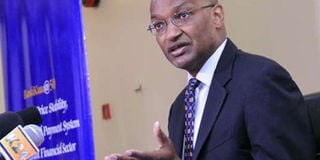Patrick Njoroge warns MPs on new law on deposits and withdrawals

Central Bank of Kenya Governor Patrick Njoroge during a past media briefing at CBK offices. PHOTO | FILE | NATION MEDIA GROUP
What you need to know:
- MPs were demanding the removal of all regulations that require one moving more than Sh1 million through the financial system to declare the source, purpose and beneficiaries
On Thursday last week, MPs Aden Duale (Leader of Majority) Junet Mohamed (Suna East) among others accused Dr Njoroge of using illegal means to regulate the banking industry, a move they said had stifled liquidity in the financial sector.
The new banking law would lock Kenya out of the global financial system if implemented, Central Bank of Kenya (CBK) governor Patrick Njoroge has warned.
The law, which was passed by Parliament last October, will also impede the war against corruption and money laundering.
Dr Njoroge spoke when he appeared before the National Assembly Finance and Planning Committee on Tuesday to explain why CBK had failed to implement the Amendment to the Banking Act Section 33C, compelling banks to issue fresh regulations on deposits and withdrawals.
BLACKLISTED
He also said that a case on the same was pending at the High Court with the hearing set for March 29.
The amendment to the law, which was done without CBK's input or involvement, required the bank to develop regulations prescribing conditions on deposits and withdrawals within 30 days from October 1, 2018.
Effectively, MPs were demanding the removal of all regulations that require one moving more than Sh1 million through the financial system to declare the source, purpose and beneficiaries.
Dr Njoroge warned that such a move would put Kenya in danger of being blacklisted by the Financial Action Task Force (FATF), of which it’s a member.
However, Dr Njoroge said the provision was difficult to implement even as the members of the committee chaired by Kipkelion East MP Joseph Limo questioned why he had not published the regulations as required, more than six months of the inauguration of the Finance Act.
Dr Njoroge said the stipulated time-frame of 30 days was impossible to achieve. “The adverse effects of the amendment on the banking sector, would be immediate termination of relationships by foreign correspondent banks and closure of accounts of Kenyan banks (derisking),” Dr Njoroge told the committee. If the comments by the CBK governor are anything to go by, it means that the regional linkages of Kenyan banks will be adversely impacted. It also puts the law in dilemma regarding its implementation.
RAMIFICATIONS
“Kenya’s banking sector will be blacklisted internationally and the country will most likely be blacklisted by the FATF,” the CBK boss insisted.
ATF is an inter-governmental body established to set standards and promote effective implementation of legal, regulatory and operational measures for combating money laundering, terrorist financing and proliferation of weapons of mass destruction.
On Thursday last week, MPs Aden Duale (Leader of Majority) Junet Mohamed (Suna East) among others accused Dr Njoroge of using illegal means to regulate the banking industry, a move they said had stifled liquidity in the financial sector.
Mr Duale said the actions by the CBK governor would lead to serious ramifications on the industry.
“When you sell your three camels and go to the bank, you are asked where the money is coming from. What the governor is doing is not good for a growing economy like Kenya. The whole liquidity in the bank is stifled. This tendency of disregarding Parliament and its powers, must stop,” he said.
According to Mr Mohamed, what CBK governor is doing in the financial sector is unacceptable and illegal.
“You cannot just wake up one morning and do irregularities in form of circulars to the financial sector. His term is coming to an end in March. This House should not renew it, we must deal with him,” he said.
TERRORISM
Mr Mohamed noted that the circulars had made it mandatory to fill forms whenever “you want to appropriate your own money, either to pay employees or for other use.” This, he added, had made majority of Kenyans to prefer “pillow” banking.
“He should not make it so difficult for the people doing genuine business because he has turned banks into documentation bureaus. We are not supporting money laundering among others, but when genuine business is being frustrated, we can’t keep quiet,” said Mr Mohamed.
The MPs’ comments forced Speaker Justin Muturi’s reaction even though he had called for patience until the governor had appeared before the committee.
“If it is being followed or a requirement being imposed on customers purporting to have force of law, unless it has been sanctioned by Parliament, they will be null and void,” Mr Muturi said.
But appearing before the Justice and Legal Affairs Committee (JLAC) on Monday, DPP Haji said lessening the rules will affect the fight against terrorism.
“If we are going to succeed in the terrorism war, the CBK governor must be supported. The rules are very important because they regulate against suspicious withdrawals and deposits,” Mr Haji said.
He also narrated how some banks violated the rules to permit money to be transferred to terrorist accounts in Syria and Jilib in Somalia that were used to fund the January 15, 2019 Dusit complex terrorist attack in Nairobi.
The CBK boss was required to publish the new regulations by October 31 2018 -30 days after coming into force of the Finance Act.





